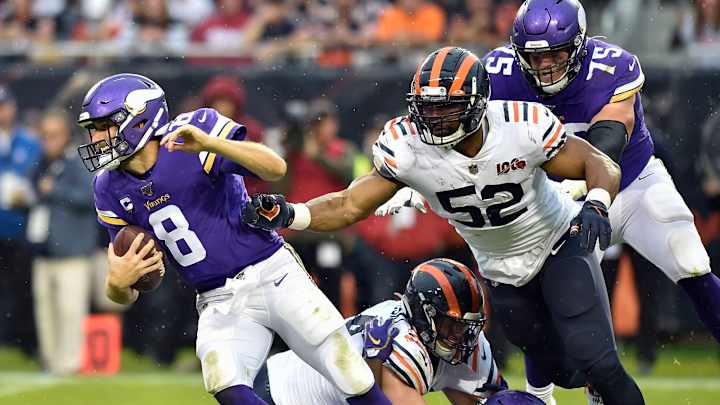Reasons Why Khalil Mack's Sack Total Could Explode

It's probably a tossup for Khalil Mack which he dislikes more: Being triple-team blocked or talking to reporters each Friday in front of his locker.
One doesn't affect the team, but the other definitely slowed down the Chicago Bears pass rush last season.
At one of these gatherings in front of his locker, Mack was asked later in the season about which extreme attempt to stop his pass rush he found most surprising.
"I feel like it had to probably be that Minnesota game, getting hit by four different people," Mack said. "That was unique. I felt like that was a unique approach. I feel like every game, it’s kind of been the same kind of thing."
That was in Week 4. A week later the Raiders tried everything possible, including cut-blocking Mack, rolling to the opposite side of the field and combining any number of methods to slow him down. Linebackers coach Ted Monachino said they blocked Mack with every position group, save quarterback.
"Wide receivers blocked him, tight ends blocked him, running backs blocked him, guards, centers and tackles blocked him," Monachino said.
Mack's drop from 12 1/2 sacks to 8 1/2 were partly due to this complete sellout on the part of offenses. The rest was partly due to the injuries on defense and other factors.
It's probably a safe assumption to expect more from Mack next season for several reasons after what the Bears experienced in 2019 and here's why:
1. Akiem Hicks Returns
Often they're lining up on the same side of the line and next to each other, so this makes double-team blocks and triple-team blocks difficult to accomplish. Hicks can require a double-team block himself with the powerful push he provides. With Hicks on the field, teams would have to settle for a chip block on Mack by a tight end or running back besides a tackle blocking him. Losing Hicks was the major factor in the Bears dropping from 50 to 32 sacks as a team. Defensive lineman Nick Williams made up some of the sacks lost when Hicks left the field, getting six one season after Hicks had 7 1/2. What Williams couldn't do was command double teams himself to prevent others from ganging up on Mack.
2. Coaches Devise Better Plans
This was the first time defensive coordinator Chuck Pagano coached Mack and experienced the extremes opponents would go to in order to stop him. He's had an offseason to review film and try to find ways to counter the triple-teaming tactics, whether it's blitzing from the slot or in the A-gap, or showing some type of blitz and pulling it back into coverage. The same is true of assistants working closely with Mack.
"This is standard stuff when you’ve got a rare guy, this is what they do and we’ve got to come up as a staff—I have to come up with a better way to get him freed up and get him to make some plays," Monachino said.
3. Better Complementary Football
It's no secret the Bears were a disaster on offense last season. They were 25th in passing, 27th in rushing, 29th in total yards and 29 in scoring. They led at halftime in only half of their games, three less than in 2018. They were forced to come from behind or play in even games too often for the pass rush to operate at an optimum level. Obviously the pass rush is going to be better when the offense trails and is forced to pass. With the offense scoring and running better, they could put Mack into better position to rush and make devoting more blockers to him less of an option for opponents.
4. Mack Counters
Mack admitted to being surprised by facing four players, and he certainly couldn't have expected being blocked by every position group on a play. He's seen about everything imaginable and could come up with his own counter measures with technique or with other things like taking out blockers who are on teammates rather than rushing the quarterback and challenging the blockers who are devoted to him. Or he could take blockers upfield more past the quarterback and give teammates more room to get past their blocker in one on one blocking. There are plenty of counter options he can do besides what coaches provide. Even if Mack doesn't get the sack, if he finds ways to get closer to the quarterback he can force mistakes or even be there for a recovery if a team forces the fumble.
5. Better Depth
A little more rest earlier in games works wonders for pass rushers later in games. It leaves them fresher for the fourth-quarter push when an opponen trailing has to pass every down. Last year Mack played 86% of the defensive snaps and Leonard Floyd played 84% of defensive snaps. Backup Aaron Lynch played 23% of snaps and made just six tackles and two sacks. Isaiah Irving played 12% of snaps and didn't have a sack after making a sack on 11% of snaps the previous year. It would be a great benefit for the Bears to have one more viable pass rush threat on the outside who allows Mack and Floyd to come off the field a few more plays. It's something they'll likely study.
6. The Schedule
The Bears will face three of last year's worst five pass-blocking teams and four of the worst eight. Also, they will be facing AFC South and NFC South teams who haven't battled Mack since earlier in his career, including several teams who've rarely faced him. Bears divisional opponents had a better plan for playing him last year, and they also played the AFC West. Besides facing his old team, the Bears played three teams who faced Mack twice a year throughout his career before he came to Chicago and knew what to expect.
Twitter: BearDigest@BearsOnMaven
